
 |
|
The Dreamers (2004) Cast: Michael Pitt, Eva Green, Louis Garrel, Anna Chancellor, Robin Renucci 2004 – 116 minutes Rated: Reviewed by Dustin Putman, February 20, 2004.  "The Dreamers" has garnered much attention and publicity for being the first major studio film to receive an NC-17 rating this millennium, but there is a far more important news story lurking at bay: this is director Bernardo Bertolucci's most complete and accomplished feature since 1972's "Last Tango in Paris." An invigoratingly sumptuous tale delving into the art of movies, the nature of politics, and the machinations between three young adults embroiled in an uninhibited sexual relationship, "The Dreamers" grabs your attention—subjectively, carnally, and intellectually—and doesn't break the spell until an abrupt and decidedly weak final scene. There are moments here that, indeed, belong in a modern masterpiece, but Bertolucci and screenwriter Gilbert Adair (working from his own novel) fail to deliver the emotionally cathartic conclusion this story deserves.
"The Dreamers" has garnered much attention and publicity for being the first major studio film to receive an NC-17 rating this millennium, but there is a far more important news story lurking at bay: this is director Bernardo Bertolucci's most complete and accomplished feature since 1972's "Last Tango in Paris." An invigoratingly sumptuous tale delving into the art of movies, the nature of politics, and the machinations between three young adults embroiled in an uninhibited sexual relationship, "The Dreamers" grabs your attention—subjectively, carnally, and intellectually—and doesn't break the spell until an abrupt and decidedly weak final scene. There are moments here that, indeed, belong in a modern masterpiece, but Bertolucci and screenwriter Gilbert Adair (working from his own novel) fail to deliver the emotionally cathartic conclusion this story deserves.
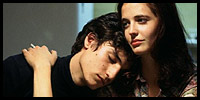 The time is 1968, and 20-year-old American student Matthew (Michael Pitt) has traveled abroad to Paris. A lover of the cinema, he experiences a chance meeting during a protest outside the local cinematheque with two fellow film buffs around his age, French brother and sister Theo (Louis Garrel) and Isabelle (Eva Green). Instantly finding comfort in their company, Matthew is invited to stay with Theo and Isabelle while their parents are out of town and soon engages in a sexual relationship with them. As their three-way bond grows deeper and more complicated, particularly for outsider Matthew, a Paris revolt threatening to topple the government has started to heat up on the streets below.
The time is 1968, and 20-year-old American student Matthew (Michael Pitt) has traveled abroad to Paris. A lover of the cinema, he experiences a chance meeting during a protest outside the local cinematheque with two fellow film buffs around his age, French brother and sister Theo (Louis Garrel) and Isabelle (Eva Green). Instantly finding comfort in their company, Matthew is invited to stay with Theo and Isabelle while their parents are out of town and soon engages in a sexual relationship with them. As their three-way bond grows deeper and more complicated, particularly for outsider Matthew, a Paris revolt threatening to topple the government has started to heat up on the streets below.
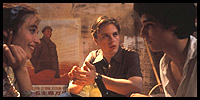 The dynamic between Matthew, Isabelle, and Theo, and their connection to each other through their love of film, is the most compelling aspect of "The Dreamers." Their time together begins innocently enough, as they delight in recreating famous movie moments and having the others guess what film they are from. A right answer paves the way for fond recollections and congratulations, but a wrong answer leads the three down a progressively destructive sexual path. Matthew grows to deeply love both Isabelle and Theo, but he also comes to recognize that the incestuous relationship between them is an unhealthy, obsessive one. If forced to choose between the two, Matthew knows Theo will always come first in Isabelle's eyes, and he has no control over the matter.
The dynamic between Matthew, Isabelle, and Theo, and their connection to each other through their love of film, is the most compelling aspect of "The Dreamers." Their time together begins innocently enough, as they delight in recreating famous movie moments and having the others guess what film they are from. A right answer paves the way for fond recollections and congratulations, but a wrong answer leads the three down a progressively destructive sexual path. Matthew grows to deeply love both Isabelle and Theo, but he also comes to recognize that the incestuous relationship between them is an unhealthy, obsessive one. If forced to choose between the two, Matthew knows Theo will always come first in Isabelle's eyes, and he has no control over the matter.
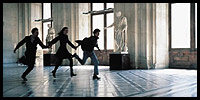 "The Dreamers" is a multilayered drama with far more on its mind than sex and nudity, however, and the picture is crammed with indelible images and scenes of sheer beauty and impact. In one joyous sequence, as alive as any so far this year, the trio run through the Louvres, their race from one end of the museum to the other marvelously intercut with an identical scene from Jean-Luc Godard's "Bande a part." The same goes for a scene that parallels Godard's "Breathless" as Isabelle yells out "New York Herald Tribune!" on a street corner. The cinematography by Fabio Cianchetti is so detailed, so assured, and so imaginative in its framing and compositions that it not only recalls the very best of the French New Wave, but deserves fully noted comparison to it.
"The Dreamers" is a multilayered drama with far more on its mind than sex and nudity, however, and the picture is crammed with indelible images and scenes of sheer beauty and impact. In one joyous sequence, as alive as any so far this year, the trio run through the Louvres, their race from one end of the museum to the other marvelously intercut with an identical scene from Jean-Luc Godard's "Bande a part." The same goes for a scene that parallels Godard's "Breathless" as Isabelle yells out "New York Herald Tribune!" on a street corner. The cinematography by Fabio Cianchetti is so detailed, so assured, and so imaginative in its framing and compositions that it not only recalls the very best of the French New Wave, but deserves fully noted comparison to it.
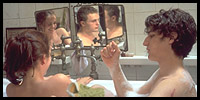 Because so much of the movie is insular, taking place within the apartment, the cast plays a major part in conveying the story through the depths of their characters. As Matthew, whose beliefs and morals ultimately feud with Isabelle and Theo's more reckless, unstable ways, Michael Pitt (2002's "Murder by Numbers") continues his star-raising journey with a performance that requires him to not only bare his entire body, but also his soul (he is up to the challenge). Louis Garrel effectively portrays Theo as a young man more internally "together" than his sister, one whom Isabelle cannot live without, but who often chooses to be on the outside looking in. As for newcomer Eva Green, she is one of the most extraordinarily original screen beauties to come around in quite some time. Green is gifted with a classic look, unlike anyone else, that lights up her every close-up, but she also exposes herself to be quite a gifted thespian. In many ways, Isabelle is the most complex and intriguing character, a woman who is blinded by the love she has for her brother even as she knows in the back of her mind that it is socially and morally unacceptable. Were her parents to find out, she matter-of-factly tells Matthew, she would commit suicide without batting an eyelash. Eva Green's brave work here is eye-opening in its unaffected naturalism.
Because so much of the movie is insular, taking place within the apartment, the cast plays a major part in conveying the story through the depths of their characters. As Matthew, whose beliefs and morals ultimately feud with Isabelle and Theo's more reckless, unstable ways, Michael Pitt (2002's "Murder by Numbers") continues his star-raising journey with a performance that requires him to not only bare his entire body, but also his soul (he is up to the challenge). Louis Garrel effectively portrays Theo as a young man more internally "together" than his sister, one whom Isabelle cannot live without, but who often chooses to be on the outside looking in. As for newcomer Eva Green, she is one of the most extraordinarily original screen beauties to come around in quite some time. Green is gifted with a classic look, unlike anyone else, that lights up her every close-up, but she also exposes herself to be quite a gifted thespian. In many ways, Isabelle is the most complex and intriguing character, a woman who is blinded by the love she has for her brother even as she knows in the back of her mind that it is socially and morally unacceptable. Were her parents to find out, she matter-of-factly tells Matthew, she would commit suicide without batting an eyelash. Eva Green's brave work here is eye-opening in its unaffected naturalism.
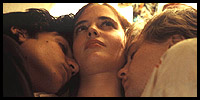 As the stakes are raised and a succession of plot developments arise during the climax, the viewer is lead to expect far more than actually occurs, at least on a physical level. In the final minutes, Matthew comes of age by realizing what it is he must do and carrying this discovery through, but his arrival at this stage feels rushed and anticlimactic. Even more confused is the underwhelming last shot, which chooses disaffection over a more humane denouement. The ending notwithstanding, "The Dreamers" is serious filmmaking—refreshingly frank and truthful in its sexual content, inventive, aesthetically accomplished, and always thought-provoking. That it is rated NC-17 is beside the point. That it holds this unfairly reviled rating and still manages to be mature and intelligent adult fare without any of the trashy condescension of, say, 1995's "Showgirls" means just about everything.
As the stakes are raised and a succession of plot developments arise during the climax, the viewer is lead to expect far more than actually occurs, at least on a physical level. In the final minutes, Matthew comes of age by realizing what it is he must do and carrying this discovery through, but his arrival at this stage feels rushed and anticlimactic. Even more confused is the underwhelming last shot, which chooses disaffection over a more humane denouement. The ending notwithstanding, "The Dreamers" is serious filmmaking—refreshingly frank and truthful in its sexual content, inventive, aesthetically accomplished, and always thought-provoking. That it is rated NC-17 is beside the point. That it holds this unfairly reviled rating and still manages to be mature and intelligent adult fare without any of the trashy condescension of, say, 1995's "Showgirls" means just about everything.
|
© 2004 by Dustin Putman |














